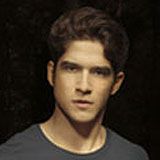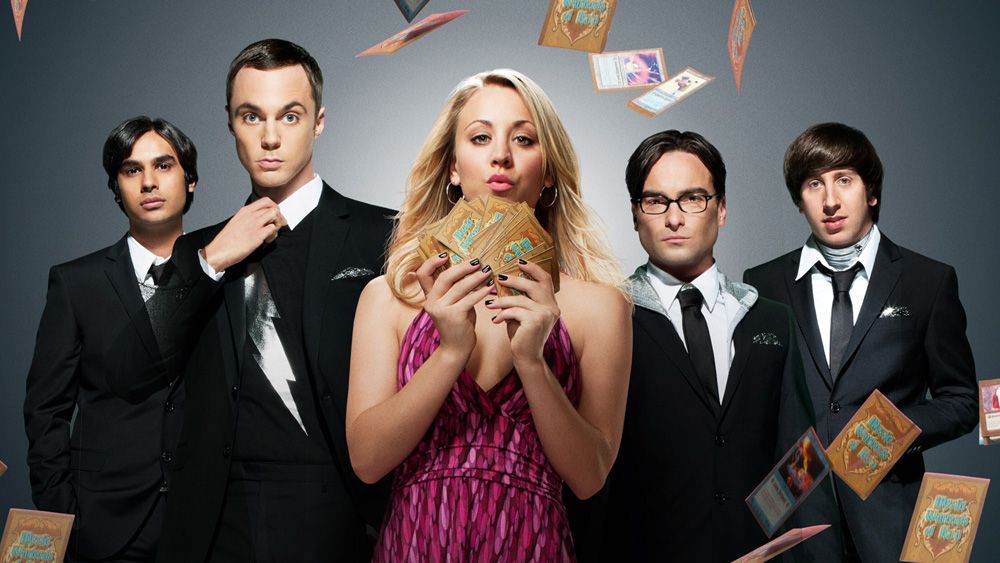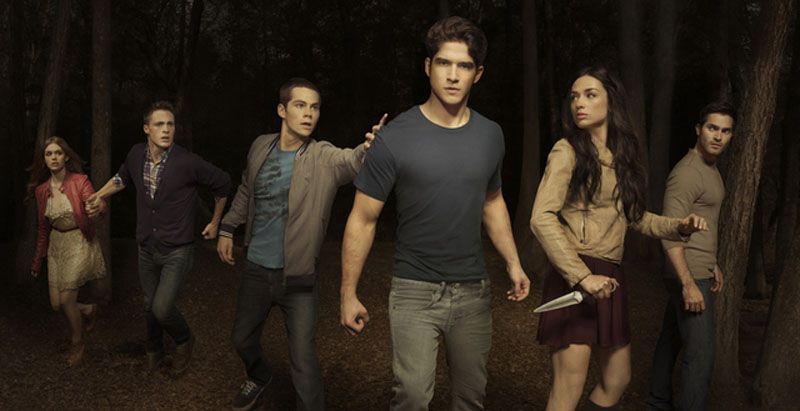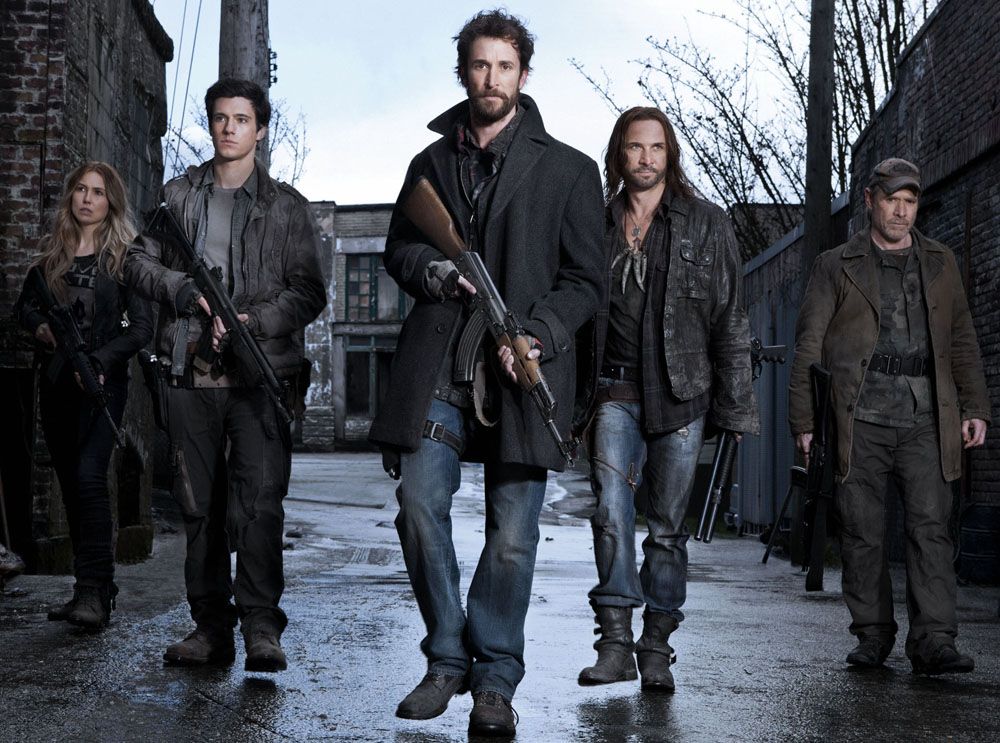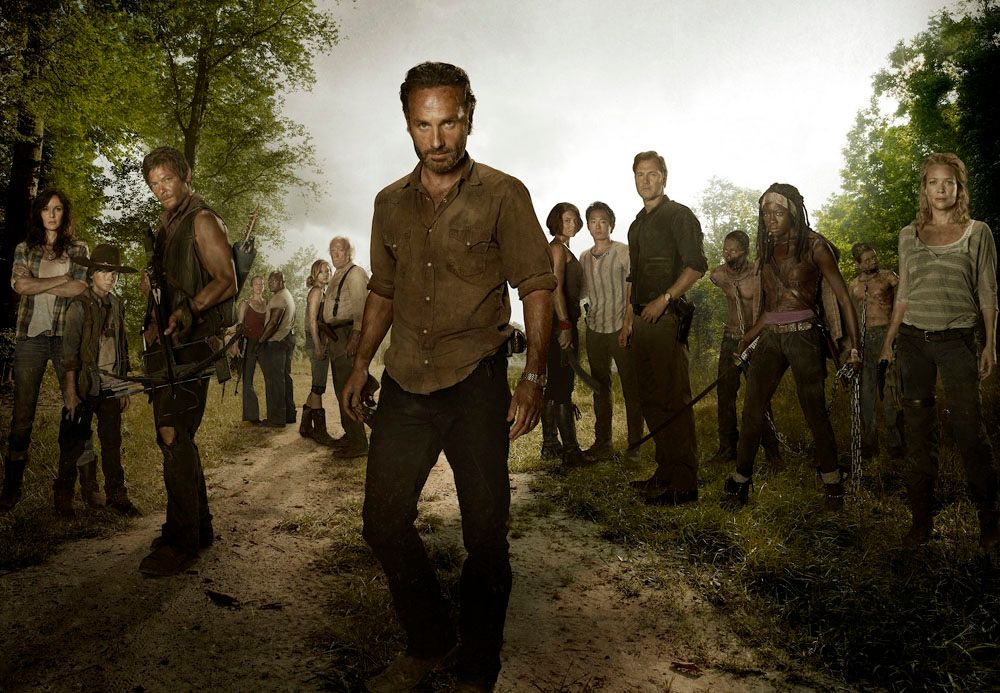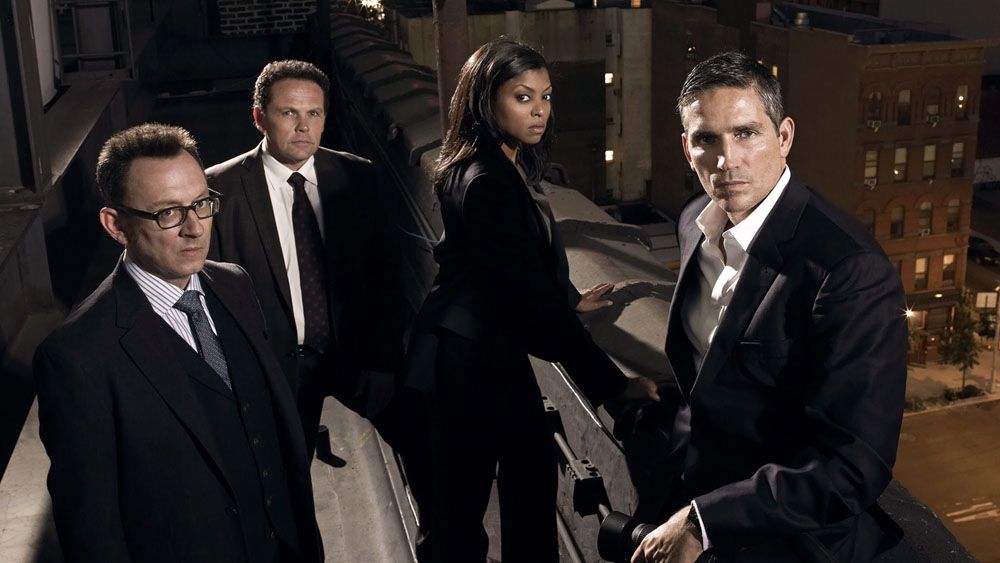A crowd of vocal fans gathered Saturday at WonderCon Anaheim to hear from the producers of their favorite television series.
Moderated by Los Angeles bureau chief Michael Schneider, “TV Guide Magazine’s Fan-Favorite Showrunners” featured: Julie Plec, executive producer of The Vampire Diaries and its upcoming spinoff The Originals; Steven Molaro, executive producer of The Big Bang Theory; Glen Mazarra, departing executive producer of The Walking Dead; Remi Aubuchon, executive producer of Falling Skies; Jeff Davis, executive producer of Teen Wolf; and Greg Plageman, executive producer of Person of Interest.
"There are two No. 1 shows on television on this panel," Schneider said in his introduction. "Look alive, people!" He then kicked off the conversation by asking the showrunners what got them interested in TV.
"The Twilight Zone," Mazarra replied, to applause. "When I was a kid, I would sit down with my dad and watch that Hill Street Blues. The one show that hit me hardest was the M*A*S*H finale. Watching those shows really made me think, ‘Wow! Somebody writes this stuff. That's really cool.’"
Plec recalled, "I had started watching soap operas when I was way, way, way too young to be watching soap operas. It actually began back at age-inappropriate 6 or 7 watching General Hospital and grew from there. … I remember in high school, LA Law would be on every Thursday night, and if anybody called during that time, they were in trouble. I would actually pick up the phone to yell at them to tell them that they were in trouble! 'What are you doing? This is horrible! You're a terrible friend.'"
"When I was in fourth grade, I was obsessed with Happy Days and Laverne & Shirley," Molaro said. "And President Ford at that time came on to do a State of the Union address. I was so upset … I sat down and I wrote an angry letter to the president. And months later I got a letter back from the White House!"
"A revelation for me on how television could be written was this spat of BBC shows that came on PBS sometime when I was growing up," Aubochon said. "Rumpole of the Bailey and a few others. What I realized, you could really twist things and turn things character-wise that I hadn't really thought of before. The BBC shows really showed how you could really dig into a character and make that become the story, which drew me in."
Davis and Plageman shared a passion for The X-Files, which they agreed helped usher in the idea of a story that builds over the course of a series instead of just done-in-one episodes. Plageman said this was important to the development of Person of Interest.
"We just went with it -- the mythology -- and CBS embraced it," he said. "People are kind of tired of the old procedurals."
Schneider then asked about the notes the showrunners receive from network executives before each episode airs.
"We get the funniest notes," said The Vampire Diaries’ Plec. "We are able to get away with a whole lot on the genre side -- you know, heads being ripped off, hearts being chopped out -- and then we'll have a werewolf turn back human, and be lying naked on the floor of a gymnasium, and they won't let us show a … continuous line of skin from his midsection to his thigh."
"It's called side-butt," added Davis, who said he deals with similar issues on Teen Wolf.
"Oh, no thrusting! Less thrusting, please," Plec continued. "No simulated thrusts. So we're chopping off heads left and right, but then a little bit of missionary sex? Censored."
Mazarra recalled, "We did have two sexual notes this year. In the season premiere, Carol says to Daryl on the top of the bus, 'Do you wanna make out?' Well, that was a more explicit line, and they were like, 'Absolutely not.' Even though we killed like 400 zombies in that episode, we couldn't have her say something a little more risqué.
"And then in an episode a couple weeks ago, we burned a bunch of zombies in a pit. And nobody realized it but it turns out one of the mannequins had a penis, and so that made it on the film. AMC wrote to us and said, 'Please digitally remove the zombie's burnt penis.'" The audience erupted in laughter.
Schneider asked Mazarra if The Walking Dead received any notes on a scene this season in which Glenn and Maggie share an intimate moment. "Our show can be pretty bleak," Mazarra replied, "and you kind of want to show that people are still in love, that they make love, and there's still human joy -- that it wasn't just everyone is miserable, standing around in a prison. That there's a life worth living."
The scene didn't receive any notes, he continued, "because it was all done very sensitively and made sense for the story."
Schneider asked Molaro about how the characters on The Big Bang Theory have changed. "We're in Season 6 now," Molaro replied, "and the audience knows the characters pretty well. First and foremost it's a sitcom, it needs to be funny. But there's no reason we can't move these characters forward, let them grow."
The moderator pointed out that most of the series represented on the panel feature on-again, off-again relationships that engage viewers. "It's those relationships that for suspense shows and horror shows, you must first care about the characters," Davis said, "and once you care about the characters you know they're going to survive this episode, but you still build tension off that."
"There's often misperceptions in television that you need to know everything about [a character]," Plageman said, "every corner of their backstory … and I don't agree with that at all. One of the first things that Finch says when we meet him is, 'I'm a very private person.' And we start to unfold this character through flashbacks. We find more pieces of the puzzle, and it makes him that much more tantalizing. The more we find out about him, the more questions we have."
"One of the things I think that almost all television writers like to do is take a character, put them together, then tear them apart!” Aubuchon said. “And then put them together again. It's fun, and I think audiences like that, too."
"Love triangles on Walking Dead are easy to solve," Mazarra joked. "We literally tear people apart."
Plec explained that all the emotional conflicts on her show come from barriers the characters build around themselves. "All of our relationships really grow out of those very simple themes of 'want to love,' 'want to be loved,' 'terror of being alone,'" she said. "What's the fun of immortality if you spend eternity alone? And so every character is driven by that fear and want."
Speaking of death, Schneider pointed out that it’s only recently that the death of a major character became a real possibility for television series. Naturally, he began with Mazarra.
"It is about the emotional connections of these characters," Mazarra said. "I see The Walking Dead as coming out of horror films. We tried to draw an inspiration from those types of films, and that's certainly where [Frank] Darabont went when he created that show. When he created the feel of the pilot, it's like a horror movie.
"What's interesting is, in TV, because you have a connection with these characters, you really cry and feel pain when these characters are killed off. That doesn't happen in horror movies. … I think we really spent a lot of time to set up those deaths, and make sure that they affect characters. Lori's death, for example, affects Rick, and if Rick's losing his mind that affects everybody else and it generates story. Those deaths are not just gratuitous, shocking moments; they're really character moments. Hopefully people think we earn them, because we really do try to do a lot of work for them."
"It's all about contract negotiations," Davis joked.
"I can't tell you how many actors have come up to me and asked, 'Am I gonna die?'" Aubuchon said to laughs. "I just love having that power! My answer, always is, 'Don't think so,' or 'I dunno.'"
Plec said she and fellow Vampire Diaries> executive producer Kevin Williamson frequently discuss how to keep stakes high in a world where death may not be the end for the characters. "He feels very strongly if there are no stakes to death -- if everyone can come back -- then you've robbed the audience of the realness, which I fundamentally agree with. However, I also look at it from the point of view of myself as a 14- or 15-year-old fan. Grief is very profound, and we as television viewers feel that.
"I'm still not over George from Grey's Anatomy!”she continued. “If George walked back in that door tomorrow, I would jump up and down, start crying, and the critic in me wouldn't think, 'Oh, wow, there's no stakes to death.' So it's a constant balance of indulging in that want you have as a viewer to be able to revisit someone that you love deeply, and knowing even in the moment of grief there's hope you may see them again."
The next big topic was Plec's new project, the Vampire Diaries spinoff The Originals, which follows a group of ancient vampires (the eponymous Originals) who have established New Orleans as a place where they can walk (and feed) freely among mankind. Joseph Morgan, who plays the villain Klaus The Vampire Diaries, will reprise his role.
"Everybody forgets in their love of Klaus — because he's so fierce and sexy — that he's a villain!" Plec said, to cheers from the crowd. "And what we do on [The Vampire Diaries], which I learned from soap operas, is that no one's a villain without purpose. No one wakes up every morning and says, 'Today I'm going to be very, very bad.' They have a point of view; they have a drive, and more often than not, especially in our show, that drive is about the fact that they were never loved or want love.
"I think there's a quote that Caroline says to Klaus, which was, 'Anyone who's capable of loving is capable of being saved.' And so I think the question is can Klaus, as a villain, set himself on a redemption journey that won't begin overtly in the first five minutes of the show. But then over the course of five years of the show, give us a good shape and good understand of who this person is and what his wants are, and if we root for him to get what he wants then people will tune in."
"Before we start questions, you've got to give us one little morsel, one little tidbit," said Schneider, challenging the writers to spoil their shows. "Greg, I'm gonna start with you. It's all about the Machine, right?"
"We're gonna find out how the Machine is evolving," Plageman said, referring to the computer on Person of Interest that allows the characters to monitor so much goings-on in New York City. "We're going to find out how the Machine is evolving, whether it's an artificial intelligence or not. … We're also going to find out how Ingram died, and how Finch got his limp."
"Season 3 [of Teen Wolf] is all about alpha wolves," Davis said. "And we learn why werewolves have different eye colors."
"Season 3 starts seven months after the second season," Aubuchon said, teasing Falling Skies. "And many many things have changed, not the least of which is a new alien presence. Our old enemies the Espheni -- or the overlords -- are desperate, so they've unleashed more terrible, alien things."
"As for the season finale of Big Bang Theory," Molaro said, "the table read is in a week and a half and we haven't written it yet! Wish us luck!"
"We will see Silas' real face," Plec said, eliciting "ooos" from the crowd. "We will see the cure get ingested. We will found out if Elenas' feelings for Fade are or are not real. And we will see whether or not Donovan graduates.”
With that the floor was opened to the fans, who immediately asked for more details about The Originals.
"It came out of the ensemble," Plec said. "The idea of actually spinning it off was mine, but it was borne out of Joseph Morgan and Daniel Gillies [who plays the vampire Elijah]. These extraordinary actors who came into our world in season two meant to be transitional characters and ended up being so good and so talented and so interesting to watch that we felt ashamed to not give them their own shot."
Another fan asked about how one becomes a showrunner.
Aubuchon rose through the ranks of the writing staff to get where his is, but still had some hard truths about the process. "Nobody can actually teach you to become a showrunner," he said. "The truth is that even as the co-executive producer I thought I was close enough to actually figure it out, but it wasn't until I actually got thrown into the job that I kind of figured out the hard way how it was."
"Every show is different," Mazarra said. "I've been showrunner three times; each show has been completely different. … First of all, showrunners write. So you have to learn the craft of TV writing and then all the producing stuff comes in, and you're just thrown into the ocean and taught how to swim — or have to figure it out."
The next fan asked about expanding the cast of Person of Interest. Plageman said he loves the idea of upgrading guest stars to cast members but "the hardest part is getting them off other shows, and we seem to be killing the ones that are really good."
One of the last questions was also about The Originals. If the spinoff is set in New Orleans, will Klaus ever return to Mystic Falls, Virginia? "You'll see him again,” Plec said. “He might be around to wish Caroline a happy graduation”

